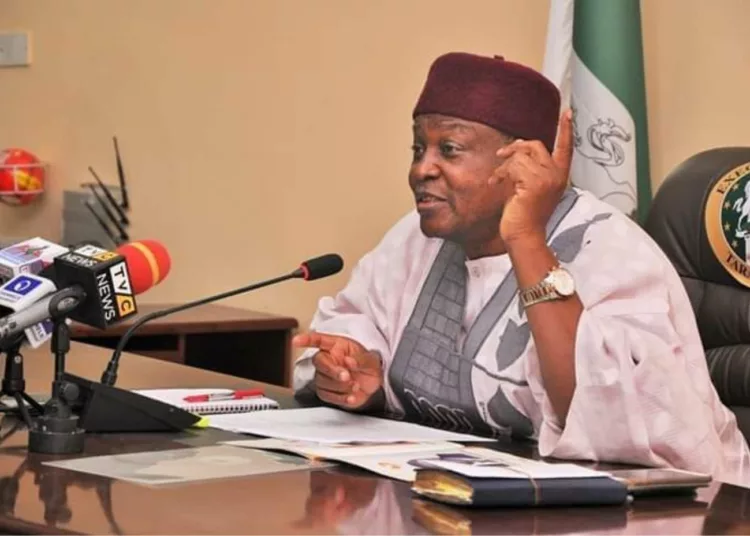Taraba, one of Nigeria’s Middle Belt States, is among the most ethnically diverse.
With three senatorial districts, namely, Southern, Central and Northern, the State is composed of over 80 ethnolinguistic groups.
Not unexpectedly, its diverse composition, coupled with other issues such as land disputes, chieftaincy tussles, religious conflicts and political clashes, has made it witness violent intergroup conflicts in all the three Senatorial Districts in differing frequency and intensity.
Factors heightening conflicts in Taraba State can be further summarized as follows: influx of migrant herders looking for grazing land; displacement of groups from their communities; population expansion; encouragement on grazing routes and the appointments of traditional rulers to name a few.
Other factors include absence of political will and non-Implementation of existing recommendations of Panels/Commissions of Inquiry into conflicts on the part of the State Government; non-compliance with extant and valid land management laws by certain herders and farmers groups; existence of local and imported ethnic militias; upsurge in Illegal mining hubs involving foreign participants with incendiary tendencies; official collusion and tolerance of security agencies as well as inflammatory religious preachings.
The recent escalation and orchestration from 2016 is unprecedented and has led to loss of lives and property as well as other unfortunate consequences like impeding crop agriculture and local livestock breeding as the countryside became unsafe due to relentless attacks.
Under these conditions, agriculture is disrupted, animal breeders lose their animals to rustlers and crop farmers their lives and crops to armed herders who roam the countryside with sophisticated weaponry while whole villages are uprooted as destruction of settlements intensify poverty and youth criminality, giving birth to a vicious cycle of violence.
The Taraba State Government initially took some steps to stem these, including the introduction of new legislations. Several Government Panels and Commissions of Inquiry and independent inquiries have proffered sterling recommendations for the control of some of these conflicts, but government’s subsequent inaction has often stalled these well-intentioned commission solutions.
The State Government, for instance enacted the Taraba State Open Grazing Prohibition and Ranches Establishment Law 2017, which sought to control the free movement of both local and foreign cattle across the state to stem incessant farm depredation and attendant herder-farmer clashes.
Nevertheless, it has remained moribund, and it is clear that the situation in Taraba calls for concerted and transparent efforts on the part of the State and Federal Governments, as well as other stakeholders in the state to end the unnecessary carnage.
In the last few years, kidnapping has come into prominence and contributes to a heightening of tense relations between the long-existing and the newer strata of the society. As I write this, the Central Senatorial District is witnessing a new wave of kidnapping epidemic.
The creation of several new chiefdoms in 2018 was greeted with unaccustomed celebrations. However, subsequent attempts by the political authorities to use these Chiefdoms as partisan political agencies, or to gerrymander their boundaries to spite political opponents, or for other purposes, greatly eroded faith in the system.
Periods of electioneering campaigns leading up to major elections, such as the General Elections, are usually characterized by increased intergroup tensions. The political animosities heighten latent and simmering land, intergroup and inter-religious tensions.
A different approach is required where there should be coordination and harmonization of federal and state policies to end operating at cross-purposes.
In this regard, both the Federal and State actors must be ready to divest themselves of ethnic, regional and religious tendencies and focus on means of getting the conflicts resolved as quickly as possible. This can be achieved by improving and strengthening institutions: judicial, security, religious and other social institutions should be reoriented and their efficiency enhanced by Governments at all levels.
Violence thrives with available sources of recruits and unemployed youth provide a ready pool for ad hoc or standing militia.
In order to prevent youths from being recruited to perpetuate violence, there should be efforts at stepping up rural development through wealth creation programmes. Accordingly, improving rural development (agric development) and the introduction of youth entrepreneurial development programmes would be a veritable panacea.
An institutionalized alternative dispute resolution (ADR) mechanism that involves traditional rulers at all levels across the state should also be created. To be sustainable, this should be complemented with cooperation with more developed ADR institutions in the country.
A community-level security architecture, involving community development organizations, CSO’s, gender-based organizations, youth and religious organizations should also be established to create awareness on the need for peaceful coexistence of the various groups in the State.
Politicians, traditional rulers, community groups, religious leaders, magistrates, judges, civil society organizations (CSOs), business leaders, market unions, youth leaders, as well as land management officers at state and LG levels should all be involved in driving the process.
These are key players in the contour of societal peace and conflict and are thus instrumental to conflict management who should be engaged in the drive towards preventing these conflicts because they are able to identify early warnings and take necessary actions before it escalates to violent clashes.
Doing this will ease the burden on government while expanding the scope of citizens’ participation and might engender the political will to drive the process to logical conclusion.
Also, the level of mistrust on the role of the security agencies would be avoided if communities are involved in identifying the culprits and allowed to play major roles in resolving the disputes.
Overall, there should be Improved governance and administration as the institutionalization of good governance, engendering transparency and high standards can lead to improvement in the state’s capacity to provide necessities of life, curtail bad and disruptive policies, and instill international best practices in all departments of governance.
– Bami-Yuno, a conflict management expert, contributed this piece from Jalingo





